I'll say more later about the extraordinary television show NCIS, which has captivated me in recent months, but can't wait for a major review to comment on yesterday's show, House Rules. This is the 12th season of NCIS, so there have been many, many episodes, and with the exception of a couple of this season's, we've seen them all. House Rules ranks as one of the all-time most beautiful. It was their Christmas show, and I don't believe I've ever seen a show that captured the basics of the holiday more effectively, efficiently, and beautifully. It's all there: law, grace, repentance, redemption, fatherly love. It's really an amazing show. The only thing that keeps me from unequivocally recommending it is that I fear that much of the effect would be lost on those who are not long-time viewers. The flashbacks and tie-ins to previous shows that are part of what makes it so powerful would seem disjointed and confusing to those without the proper background.
But I'm in awe of the writers and actors who made it happen, and glad we took time out of a busy holiday schedule to experience it.
 Wool by Hugh Howey (2012)
Wool by Hugh Howey (2012)
Despite being a die-hard science fiction fan in my younger days, I rarely venture into the genre now. But I found my sister-in-law's description of Wool intriguing enough to request it from our library. And it is an intriguing story. Or, rather, set of stories, as this was an omnibus collection of Wool, Wool 2, Wool 3, Wool 4, and Wool 5. The 532 pages slipped by quickly, though I was surprised at how dissatisfied I was. The premise is good, the characters interesting, the plot twists satisfying, and as far as I can tell the author writes well. The ending did not disappoint. So why the dissatisfaction?
Perhaps because it was just a bit too gritty for me. I enjoyed the first book most, and thought that perhaps our oldest grandchild might like it. But it seems as if the author's critics told him after each book that he needed more profanity, gore, and action scenes. True, it all fits into the story, but made it much less pleasant to read. (Though it did remind me of one reason I prefer books to movies—it's a lot easier to skim through the fighting.)
My dislike of violence and profanity does not mean I like insipid books. I've read plenty of squeaky-clean books that left me feeling as dissatisfied as Wool. I prefer a book, like The Lord of the Rings (NOT the movie) where the paragraphs are a delight to read and the complexity and depth stand up to multiple re-readings.
I believe my dissatisfaction came because my strongest and most important criterion for enjoyment of a book, play, movie, or television show is whether or not the experience leaves me wanting to be a better person. It doesn't have to be super-spiritual, but I want to be inspired to be kinder, to be more clever, to make our home more inviting, or even just to run a little faster—but to be better in some way. Wool left me feeling that I had read an interesting tale, but nothing more.
The ending cleverly left room for many more books in the same setting, and there are at least four more available, though not at our library. If, someday, the library chooses to add them, and if I'm in the mood for something merely relaxing, I may return to the story: there are a few characters I'd like to follow further....
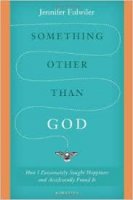 Something Other Than God: How I Passionately Sought Happiness and Accidentally Found It by Jennifer Fulwiler (Ignatius, 2014)
Something Other Than God: How I Passionately Sought Happiness and Accidentally Found It by Jennifer Fulwiler (Ignatius, 2014)
I've been a fan of Jennifer Fulwiler's Conversion Diary blog since it was called Et tu?, which takes me back at least as far as 2008. Granted, like Free-Range Kids and the Front Porch Republic, it has gotten short shrift in the last year or so simply because I like it so much: not only was I spending a lot of time reading (which I could have managed) but it too often inspired me to spend much more time writing (which I couldn't). I long to get back to these excellent blogs again, but only after I've acquired more control over responsibilities closer to home.
Be that as it may, when I discovered that our library now has copies of Something Other Than God, I grabbed it, all other responsibilities notwithstanding. Having followed the conception, gestation, long-and-agonizing labor, and finally birth of this book, how could I not? Okay, a real fan would have bought a copy, rather than waiting for the library, but if possible I like to know what I think of a book before I spend money on it.
This one is well worth spending money on, if you can't borrow a copy. (Heather, the Concord library has it.) Jen writes really well, even without an editor, and if I can perhaps detect a little heavy-handedness on the part of that editor ("you need more adjectives"), I can still say with assurance that the agonizing re-re-re-writing process resulted in a well-told, powerful, and entertaining story. My current Kindle-read was set aside once I opened the book, and I finished it two days later—it would have been sooner had I not had some discipline to avoid seriously compromising my other responsibilities. It's a compelling story, serious and funny, and seriously fun to read.
Something Other Than God takes its title from C.S. Lewis, who wrote: All that we call human history ... [is] the long, terrible story of man trying to find something other than God which will make him happy. Jen's journey from fire-breathing atheist to devout Catholic is not only for people who appreciate conversion stories; even those who are certain the pilgrimage took her and her husband in the wrong direction can appreciate the humor and the sheer humanness of the story.
The back-cover endorsement written by Gretchen Rubin (author of The Happiness Project) says it well: Thought-provoking, honest, and often hilarious. It will strike a chord with anyone who ever posed—or tried unsuccessfully to avoid—the big questions of life.
But those who are familiar with Jen's blog will be disappointed to learn that there is no scorpion story. Not one.
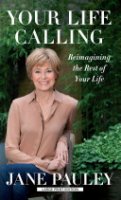 Your Life Calling: Reimagining the Rest of Your Life by Jane Pauley (Simon & Schuster, 2014)
Your Life Calling: Reimagining the Rest of Your Life by Jane Pauley (Simon & Schuster, 2014)
This is why we have friends. I would never have picked out this book to read. For one thing, I tend to avoid books by or about celebrities. For another, I in no way can identify with people who, when their children go to school, or leave home, or when they turn 50, or retire, say, "What on earth am I going to do with the rest of my life?" I don't need a new life; I have enough planned in the one I have now to see me through more productive years than I can possibly have left.
But a friend highly recommended Pauley's book, and I'll admit that it kept my interest even though I didn't buy into its focus. The Penzey's fans among my readers will best understand the effect that Your Life Calling had on me. It was very much like reading a Penzey's catalog, where I find myself repeatedly annoyed by the self-aggrandizement, the leftist slant, and the in-your-face distain for several of my strongly-held principles—yet I keep reading, because the stories are interesting and inspiring.
Pauley premise is that our generation is the first to have the long lifespan and the leisure to "reinvent" ourselves, possibly several times as we go through life. Today's young people are already doing it ("what we call reinvention is just 'the churn' for them"). In fact, for them it may be more of a necessity, given the pace at which technology (and thus the job market) is now changing. (The last sentence is my analysis, not Pauley's.) But it's new for us.
You may be surprised to know that people over fifty-five represent the largest age group of owners of new business start-ups. At an age when our own parents and grandparents expected to wind things down, people are getting a second wind.
The Stanford Longevity expert, Laura Carstensen, notes that withour new vitality come some pretty big questions. She says, "Those of us living today have been handed a remarkable gift with no strings attached—an extra thirty years of life for the average person. Now that gift is forcing us to answer a uniquely twenty-first-century question—what are we going to do with our supersized lives?"
Permit me an exasperated wail at yet another expert who misunderstands the term "life expectancy." But aside from that, it is true that our generation finds itself thinking in terms of second, often radically different, careers more than previous generations. One only needs to listen to someone of my parents' generation talk to realize that the men, at least, defined themselves very much by their careers. Of my generation this is less true, mostly I think because we were betrayed by the "be loyal to your company and your company will be loyal to you" compact. What is "me" is not my employment, and therefore I am free to move on to something entirely different.
That I get, as evidenced by my need to elaborate on it. I also appreciated Pauley's description of Imposter Syndrome: (More)
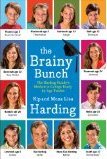 The Brainy Bunch by Kip and Mona Lisa Harding (Gallery Books, 2014)
The Brainy Bunch by Kip and Mona Lisa Harding (Gallery Books, 2014)
Facebook, like smartphones, can enslave or empower. Or both at once. At the moment I'm feeling grateful to Facebook, and the friend who posted a link that eventually led me to this Today Show feature about the Harding family and their book.
As most of you know, education has long been my passion, particularly the education of young children, and most especially my belief that most children can learn and do so very much more than we give them the opportunity to achieve. It will thus come as no surprise that when I heard of a family where seven (so far!) of the children had gone to to college by the time they were twelve years old, I immediately ordered the book from our library, and finished reading it the day after I picked it up. If read with an open mind, this is a book that can blow away a number of stereotypes and presuppositions, and not just about education.
Although a large number of homeschoolers are Christians, including many who have spectacular records both academically and socially, as the movement has grown there have slso been examples of less-than-stellar achievement, especially in academics. It is unfortunate that when many people think of "Christian homeschoolers," it is the latter example that comes to mind. The Harding family is a stunning counterexample, especially since The Brainy Bunch bristles with buzzwords that set off alarm bells: Mary Pride, A Full Quiver, Josh Harris, early marriage, Michael and Debi Pearl (at least they label the Pearls' book "a bit legalistic"), creationism, the Duggar Family, and others that might send some running for the hills. But hang on—they also mention John Taylor Gatto, Raymond and Dorothy Moore, unschooling, and the Colfaxes, quite on the opposite end of the spectrum (inexplicably leaving out John Holt, however). Mona Lisa and Kip sound like people after my own heart, able to take the best from many sources and leave aside what doesn't work for them. In any case, the family deals a clean blow to many prejudices, including that of the college student who once told them, "Children in big families have low IQs."
The Hardings insist, however, that their IQs are strictly average; their children are not geniuses. This bothered me at first, as it seemed almost a reverse boast, as if there were something wrong with being smart. But I think I know why they make this point, and it's important. There are a surprising number of people who have gone to college at an extremely young age (here's a list of the ten youngest), but they are generally prodigies with super-high IQs and extraordinary skills. This does nothing to encourage most families to believe that early college entrance is possible for their children. Or desirable. Despite its title, The Brainy Bunch shows that this higher-level work is well within the grasp of the average student, and why this is a good idea.
Some might even say the Hardings started out as a below-average family, or at least one with several strikes against it when it came to predicting their children's academic success. Kip and Mona Lisa were high school sweethearts who married in their teens. After high school, he went into the military and she started having babies. Lots of babies. Their life was not easy, requiring many moves, and times of great financial hardship. And yet here they are, with their children not only college graduates but successful at a young age in many fields: engineering, architecture, medicine, music, and more. (More)
 The Jungle by Upton Sinclair (1906)
The Jungle by Upton Sinclair (1906)
I'd heard in high school about this exposé of the Chicago meat-packing industry at the beginning of the 20th Century, but somehow my history teachers and my English teachers didn't collaborate enough to require me to read it. That's probably just as well, as I was operating under the all-too-common theory that if a book was required in school, it couldn't possibly be interesting.
Forty plus years later, I finally read The Jungle, thanks to a suggestion from the Great Courses' Turning Points in American History. Contrary to my expectations, I found it riveting, very difficult to put down. (Whether I would have found it so in high school is another question, and I don't know the answer.) It's depressing enough, following the Lithuanian immigrant protagonist as he and his family are crushed by the dark side of the Industrial Revolution, the unrestrained and unregulated industrial monopolies, and the rampant immigration that encouraged the view of human laborers as expendable. But it's a gripping story, which makes the end of the book all the more distressing. I knew better than to expect a happy ending, although a hopeful one would have been nice. I was expecting a tragic ending, and certainly there's plenty of tragedy to go around. But The Jungle never ends. The protagonist discovers Socialism, and after the reader is led through pages of Socialist diatribe, the book simply ends. Upton Sinclair uses and abandons his human characters for the sake of his cause, just as the industrial and political machines use and abandon them in his story.
Sinclair wanted to write a powerful book, one that would have a profound social effect, like Uncle Tom's Cabin before it, and in this he succeeded. Emotions stirred by The Jungle, including those of President Theodore Roosevelt, led directly to the passage of the Pure Food and Drugs Act and the Meat Inspection Act, and eventually the establishment of the Food and Drug Administration. But the contamination of the country's meat products was not Sinclair's chief concern; he wrote the book for America's workers, for the exploited immigrants. As he later said, "I aimed for the public's heart, and by accident hit it in the stomach."
The Jungle has been accused of exaggeration and falsification, and no doubt Sinclair took some artistic liberties. But all in all the experiences ring true, not only to what we imagine life to have been like at the turn of the 20th century, but also to what has been documented as happening here and now: monopolistic practices, downward pressure on the value of labor due to rampant immigration, enslavement of immigrants, drug and alchohol abuse, sex trafficking, the widening gap between the rich and the poor, and agribusiness practices that encourage disease and contamination. We've come a long way over the last hundred years in protecting ourselves from the evils of the human heart. But the evil in our hearts still remains.
Courtesy of the National Archives, here's an article that gives a better picture of the von Trapp family than The Sound of Music movie does. I still like the movie, but the real characters are more interesting.
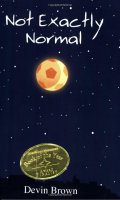 Not Exactly Normal by Devin Brown (Eerdmans, 2006)
Not Exactly Normal by Devin Brown (Eerdmans, 2006)
As often happens at the Maggie P., we had some "relatives of a relative" come visit yesterday. One of them, a nine-year-old boy, brought with him this book. I picked it up, read a page, became intrigued, and then spent my spare moments devouring it before the family had to leave.
I appear to be on a roll here. Like The Silent Swan, which I also read and reviewed recently, Not Exactly Normal is a book written for young people, set in a school (middle school age this time), from a Christian perspective ... and I liked it! Two Christian authors in a row who include faith in their books naturally and reasonably, without the awkward, embarrassing, beat-them-over-the-head language of so much recent Christian fiction! Who'd have thought? Even though Not Exactly Normal deals with important philosophical issues, it is not what people think of as a religious book. It's a human book. And one with which I can identify much more than most books written for young people these days. One Amazon reviewer said,
I wonder whether the erudite family and school setting he is privileged to have would be something a "typical" American middle-schooler could really relate to.
But the family (though sadly, not the school) experiences are exactly why I relate to it—and not to most of what's out there. As the same reviewer also said,
Any text that includes discussion of John Donne's poetry, background on Good King Wenceslas, Pele and Mia Hamm, and excerpts from T.S. Elliot's Old Possum's Book of Practical Cats in a way that younger readers can understand and even enjoy is definitely to be recommended.
And, I might add, computing square roots by hand. (Taught in the classroom, though unfortunately not demonstrated in the book.)
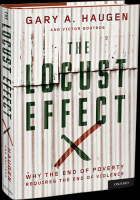 The Locust Effect by Gary A. Huagen and Victor Boutros (Oxford University Press, 2014)
The Locust Effect by Gary A. Huagen and Victor Boutros (Oxford University Press, 2014)
First world problems, even for the poor, really are different from those of the developing world. That doesn't mean they're not problems; dearth and excess are both damaging. Think starvation versus industrialized food and an obesity crisis; no schools versus an educational system with a stranglehold on our lives; lack of basic medical care versus a health care machine that takes birth and death away from home and makes us dependent on drugs.
We also have a hyperactive legal system that shackles our lives and has taken common sense out of the rule of law. The developing world? Rampant, violent crime and a legal system that protects the perpetrators and victimizes the victims.
Nearly fifty sticky-notes festoon my borrowed copy of The Locust Effect, but I don't have time to type them out. I could wait, but I'll never have time to do justice to the book—or more importantly, to its ideas. So I'm going to take the easy way out and suggest, strongly, that you check out the websites of The Locust Effect and of the International Justice Mission.
The Locust Effect is an extremely important book. Essential, really, for anyone who cares about the poor and suffering of the world. It lays out a strong and effective case that the most basic, most critical, and least recognized problem of the world's poor is the lack of an effective system of justice to protect them. Occasional police brutality and corrupt lawyers notwithstanding, we take it for granted that our legal system is there to protect us from crime. For much of the world, however, that is simply not the case. What good is it to provide seeds and farming tools if the land with all its crops is likely to be stolen? To promote the education of girls if they can expect to be raped on the way to school—or by the teacher? Why provide medical care if the man cured from his disease then rots in jail for 30 years just because he happens to be walking down the street when the police are out, press-gang style, looking for someone, anyone, to convict for a crime committed by someone who has paid well to be acquitted?
If the websites don't convince you, then by all means read the book. If you worry that the authors would take anything away from programs that feed the hungry, provide microloans to impoverished women, build libraries and schools, or otherwise meet other critical needs, then read the book. If you believe the need, but fear the problem is hopeless, read the book. The book's 346 pages provide exhaustive documentation of both the problems and approaches that have shown great success. But "exhaustive" is the operative word. As befitting lawyers, the authors dot every i and cross every t, and like Presbyterian preachers make their points over and over again. I highly recommend reading the book, but if there are easier and faster ways to get to the ideas, I'm sure the authors would still approve.
Violence against the poor is a difficult and dangerous problem to solve, but not impossible. There is no magic bullet; it takes courage and hard work and a whole lot of patience and perseverence. The first step is bringing this hidden and unacknowledged crisis to light, and The Locust Effect does that well.
 The Silent Swan by Lex Keating (AltWit Press, 2013)
The Silent Swan by Lex Keating (AltWit Press, 2013)
Having found myself in the vicinity of Stephan's Kindle, I could not resist reading his copy of The Silent Swan. Were it not for his positive review, I would have passed on the opportunity, as coming-of-age stories and romances are both near the bottom of my genre preferences. (You can read his review here.) However, The Silent Swan is so much more than that. (The cover is unfortunate. Maybe not for the author, since in my observation that kind of cover sells. But it hardly does justice to the book.) What really hooked me is that the story is a mystery, and I'm a sucker for mysteries. Trying to unravel the truth kept me reading, and the ending did not disappoint. Overall, I give the book four of five stars. But for the romance/teen angst/school story genre, it deserves at least a ten. Ditto for the "modern Christian fiction" genre. The bar is really, really low in those categories, which makes The Silent Swan a standout.
It almost lost me in the first chapter. I suppose that if a character is going to develop gradually over 580 pages, it helps to start from a bad place. I really hate it when people do stupid things in books, and the protagonist was being really stupid. Granted, the action takes place in a school, among hormone-laden teenagers, which is practically a recipe for stupidity ... but still.
I've said this before—in my review of Stephen Lawhead's The Skin Map—but it's equally true here: "My least favorite [parts of the book] were the drawn-out descriptions of the physical appearance of every female character encountered, and the even more interminable battle scenes, both of which were obviously included for the more testosterone-laden among us." The Silent Swan is clean, almost grandchild-safe (and probably better than much of what our eldest has already read), but violence and sex still sell to some segments of the audience. I found the brotherly squabbles (and fights) annoying, even boring; and if this story provides an accurate description of what goes on in a teenage boy's mind whenever he sees a woman ... let's just say I'm feeling a lot better about burqas. It's not porn, but even I am enough of a feminist to find it outrageously insulting. (Yet this is 'way better than so much of what's available and aimed specifically for the teenaged audience.)
There are some points where the story stretches my "willing suspension of disbelief" too far. It is unfathomable that in any family these days, let alone a family with a full-time employed mom, kids could grow up so ignorant in the kitchen. Haven't they heard of cookbooks? Or allrecipes.com? I can see asking them to have meal responsibilities, but what parents expect so much from someone with no preparation at all? I actually know someone who was taught to swim by being thrown into the middle of a lake—but even then the instructor was there to keep her from drowning.
The main female character is also omni-competent in so many areas that for some that will be the least credible part of the book, but I see it as a strong point: I know teenagers can be and do so much more if allowed to break out of their media- and school-induced comas! If she is a bit too much of a superhero, she's also the most human and reasonable of all the characters, and in her courage, perseverance, intelligence, and (non-romantic) love is a positive female figure—something I find very rare.
I mentioned that The Silent Swan is a standout in the modern Christian fiction genre. Frankly, I don't know whether or not the author intended it to have that label. Certainly J.R.R. Tolkien would not have accepted such a designation for his works, and they are some of the best Christian fiction extant. But it deserves consideration, because I could see this book selling in a Christian bookstore. Certainly the cover looks like the Christian romances I've seen there. Yet one of its strengths is that it's a Christian novel that is hardly recognizable as a Christian novel. It's not The Lord of the Rings, but is nonetheless infused with Christian attitudes and values while completely eschewing overt Christian language. Stories with altar calls just. don't. work. At the same time, it's not one of those books by postmodern Christian authors, who throw in bad language and questionable content just to prove they're "authentic" and without religious hangups.
The Silent Swan is both too hard and too easy on the foster care system, so I'll average that out to okay.
All the sibling violence to the contrary, the protagonist's family is solid, full of mutual respect and love, and with no quarter given for disrespecting the parents. That, sadly, is a rare quality in the books that are pitched to children these days. And if his mind starts out one-dimensional when it comes to women, he does grow considerably, and in all the right directions. Respect for family; love as something greater than sex; the idea that life might be more serious than going to prom; basic honesty; resisting seduction; the importance of setting oneself up for success in potentially risky situations (e.g. being in a group rather than alone with your girl on a deserted beach)—these are not popular attitudes, especially in young adult books, but are presented as good, reasonable, and believable in The Silent Swan.
The Silent Swan is a well-constructed and clever take on one of Grimm's fairy tales, The Six Swans. I won't say the writing is great, but it's good, and that's saying a lot in these days of slap-dash writing, and of editiors and proofreaders who apparently have time to do neither. I've recommended it to our library for purchase, and I hope Lex Keating has another book in the works.
Note: Now that I have a Kindle, buying books is a harder decision. Susan Wise Bauer's History of the Renaissance World is still on my Amazon wish list; I would have bought it months ago if I could only decide whether to get the physical book or the Kindle version. Unfortunately, it's not part of the Kindle Matchbook program, where you can get the Kindle version for little or nothing if you buy the printed book. While writing this review, I decided to buy the Kindle version of The Silent Swan for myself (it's only $2.99), but then I noticed that it IS part of the Matchbook program, and what if I later decide to get the book, which at the moment is a pricey $17.99? I would have wasted the opportunity. Decisions, decisions. (Amazon Prime members can read the book for free, by the way.)
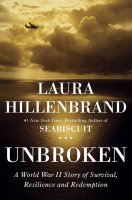 Unbroken by Laura Hillenbrand (Random House, 2010)
Unbroken by Laura Hillenbrand (Random House, 2010)
There are math prodigies. There are music prodigies. And then there is Louis Zamperini, who can only be called a survival prodigy.
Read the Unbroken before the movie comes out. Not that I know anything bad about the upcoming film, but I do know that movies have a track record of focussing on the action while missing the subtleties. Not that there aren't subtleties I'd rather have missed.
To summarize the story of Zamperini—Olympian, WWII pilot, prisoner of war—might give away too much. You could read the Wikipedia article, but I don't recommend it. Let Laura Hillenbrand be the storyteller; she does the job remarkably well.
One caveat: Although I recommend Unbroken highly—it is a remarkable story, horrifying and wonderful—I'm not sure about recommending it to anyone with an active, visual imagination. I'm not one who visualizes what I read well, as I'm usually in too much of a hurry to get on with the story. But evil images can make an impression in a flash, and one particular incident haunted me for days. It still does, though I'm getting better at banishing it when it intrudes. I certainly can't recommend the book to grandson Jonathan, for example, though it's well within his reading ability and would give him important insights into World War II, the clash of cultures, the depths of evil, and the power of grace. It would also scar his young soul. As an aunt, I'm even reluctant to encourage our nephews to read Unbroken, but I have to realize that, being teens and older, their souls have probably already been scarred. Certainly several of them are old enough to have been in the story had they lived at that time, which is another reason it's hard to read.
Three observations that should not be spoilers:
- As a child, Louis Zamperini could only be called a juvenile delinquent, despite a reasonably happy family life. The traits that made him so were apparent even when he was a toddler, though they were exacerbated by problems at school. It's clear that these same characteristics also drove him to be an Olympic athlete, a war hero, and a survivor in unspeakably brutal conditions. In a society where unruly children are routinely drugged into compliance, where they have no acceptable outlet for their wild energies, where their natural talents are quashed rather then channelled—where will our heroes come from when we need them?
- The brutality of the Japanese prison camp personnel was almost beyond belief. Take a generation or two of any society: abuse them physically and mentally, daily and as a matter of course, in school and in the military; teach them that surrender and capture are the ultimate in shame and degradation; above all, fill them with the certainty that they and their people are vastly superior to all other beings ... and then put the dregs of that society, the failures, and the mentally ill in charge of the prison camps. What is astonishing is not the consequences, but how quickly they come to fruition.
- Despite seeming evidence to the contrary, good is vastly more powerful than evil.
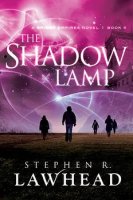 The Shadow Lamp by Stephen R. Lawhead (Thomas Nelson, 2013)
The Shadow Lamp by Stephen R. Lawhead (Thomas Nelson, 2013)
I'd been looking forward to the next installment of Lawhead's Bright Empires series since I finished #3, The Spirit Well. (#1 is The Skin Map and #2 The Bone House.) Fortunately, our library is generally quite responsive to suggestions for new books to acquire, and I recently finished #4, The Shadow Lamp. Glad to return to the adventures of the characters and to Lawhead's captivating, if disorienting, world, I was alas somewhat disappointed by this installment. The first three books I found increasingly interesting and well-written, but this one did not hold together as well. There are so many characters now that even 371 pages provide only snapshots where I was hoping for a movie.
What's more, as the story nears its climax, its Christian foundations have become more explicit. This is hard to articulate, as it's more an impression than something rational, but I found it more effective in the background. Unlike many Christian writers, certainly most modern ones, Lawhead does a good job of making it integral to the story rather than preachy. But that sort of thing is so very hard to do well. It's akin to the problem of portraying a truly good person; it was C.S. Lewis who expressed the problem best when he acclaimed George MacDonald all but unique as a writer whose good characters are believable and his villains "stagey," instead of the other way around (preface to George MacDonald: An Anthology). What Lewis called the "Kappa element" in a story (very roughly, the atmosphere, flavor, or tone that infuses the tale) is what makes it convincing for me, as in Tolkien's The Lord of the Rings, which is shot through from beginning to end with Christian truth that never comes explicitly to the foreground. The Shadow Lamp loses something by making it so obvious.
All that aside, it was good to become reacquainted with the characters and a truly fascinating and imaginative story, and I'm hoping for better in the final book, The Fatal Tree, due to be released in September. If you're interested in the stories, by the way, and haven't yet begun the series, I recommend waiting for the last book to be released, so as to be able to read them in quick succession. It's too complicated a tale to let many months go by between books.
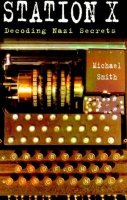 Station X: Decoding Nazi Secrets by Michael Smith (TV Books, 1999)
Station X: Decoding Nazi Secrets by Michael Smith (TV Books, 1999)
Writers like Michael Pollan, John McPhee, and Rowan Jacobsen can take the oddest subjects and weave them into a riveting story. Would that any of them had written Station X! Michael Smith has a riveting story: the long-kept secret of the codebreakers that revealed so much of Axis strategy and tactics during World War II. The facts themselves kept me reading the book, but I'd have finished it in a day if it had been written as I'm sure it could be. Without a doubt it's a story worth knowing, and you can get a taste of it from Wikipedia.
I had heard, of course, that the British had cracked the Germans' supposedly uncrackable Enigma Machine in WWII, a fact that only became known much later—the techniques were still being used in the Cold War—leaving participants from the lowest level to Winston Churchill unable to talk about what they did during the war. Here are a few things I didn't know:
- The success was not due to a "big break" that solved the problem once for all, but to many little breaks that added up and to much tedious work—work and breaks that needed to be repeated and achieved every day. In addition to serious mathematics, cracking the codes required intuition, imagination, guesswork, and persistence. Old-fashioned, flesh-and-blood spying played a significant role, and good ol' human mistakes (such as starting a message with the very recognizable "Heil Hitler!") were essential.
Success depended very largely on German operators ignoring the rules. "We could usually break things when we identified the human error and that was what it was all about," said Mavis Lever. "If the Germans had kept to the rule book and done it properly, as they were instructed to do, then of course we wouldn't have been able to get it out."
Among his many achievements, Tiltman had helped to crack the cipher used by the Japanese naval attaché in Berlin, assisted by the latter's tendency to begin each of his reports with the phrase: "I have the honor to report to your excellency that..."
- Cracking the codes began during World War I.
- The Poles made the first critical break, providing both irony and concern later, during the Cold War.
- Bletchley Park workers were a motley crew of brilliant and eccentric folks. The initial group consisted mainly of liberal arts professors, on the grounds that codebreaking primarily required language skills. When mathematicians were brought in they and their work were viewed with suspicion: what could they possibly contribute? (More)
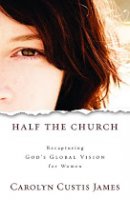 Half the Church: Recapturing God's Global Vision for Women by Carolyn Custis James (Zondervan, 2011)
Half the Church: Recapturing God's Global Vision for Women by Carolyn Custis James (Zondervan, 2011)
I've reviewed three of Carolyn Custis James' books before (When Life and Beliefs Collide, The Gospel of Ruth, and Lost Women of the Bible); this is her most recent and I'm happy to say our library added it to their shelves at my request. I'm not even going to attempt to rank the four, but just say that Carolyn James isn't losing any steam. She continues fleshing out her discoveries concerning a Biblical view of the role of women, not only in the church but in all creation. This time her vision was inspired and enhanced by her reading of Half the Sky (Kristof/WuDunn).
As usual, and despite her own assurances to the contrary, I think James underestimates both the difficulty and the importance of full-time, long-term motherhood, and is in danger of heaping still more burden and guilt on those who are already struggling. I truly get her position that "marriage and babies" is an insufficient—downright paltry—vision of God's overall plan for his daughters, implying that the young, the old, and those without husbands or incapable of bearing children are second-class citizens in God's Kingdom. However, I believe that a vision of childrearing as only a short interlude in one's life is also deficient, and that James misses important contributions of those who have committed to large families (now defined as more than two children), childrearing as full-time work, and homeschooling. She also appears not to understand how difficult and intellectually challenging it is to do well in such a profession, and how little such people are respected by society (including most churches).
But that is not James' battle, and one cannot cover all bases in every book. What she does cover, she handles superbly.
As usual, here are a few random quotations, to give you a feel for Half the Church, and to remind my future self of what's inside.
Literary experts tell us every good story has conflict. ... In fact without conflict a story has no plot. ... Which made me wonder, if God is the master storyteller—the creator of story—and if conflict makes the story, is there conflict before Genesis 3? ... If humanity had never fallen into sin, would we be living in a plotless story now? For that matter, will heaven be plotless? Is conflict only and always destructive and the result of fallenness? Or is there a healthy, necessary, constructive variety of conflict that creates a gripping plot and is designed to make God's image bearers flourish and grow? (pp. 66-67)
Conflict brings out the leader in us, transforms our lives from the mundane to the cosmic, and by God's grace forges us into more compassionate, selfless leaders. Conflict in our stories isn't in the way; it is the way—to becoming better leaders, better image bearers, to creating a better story—to the fulfillment of the Story. (p. 97)
Nunsense was written in 1985, but neither of us had seen it until Sunday. We went to the performance at Sanford's Wayne Densch Performing Arts Center because our friend Linda was the music director for the show. As it turned out, we knew one of the main cast members, too—a friend of Heather's from high school. She played Sister Hubert and did a fantastic job. Everyone did a great job, actually, though some had better enunciation than others, so we didn't always get the jokes because we didn't catch all the words.
A few of the jokes were less than family-friendy, but they'd probably go over the heads of anyone who shouldn't hear them, and compared with much of what can be seen today, the show is fitting for—well, for a convent!
Afterwards we had a (too) quick bite to eat at the Willow Tree Café. German food is not normally my favorite out-to-eat meal, but this was excellent and I'd love to have an excuse to go back.
We had the Gourmet Potato Pancakes and the Sausage Sliders from this menu. Both were worth repeating, although next time I may want to try the Reisen Bretzen.


